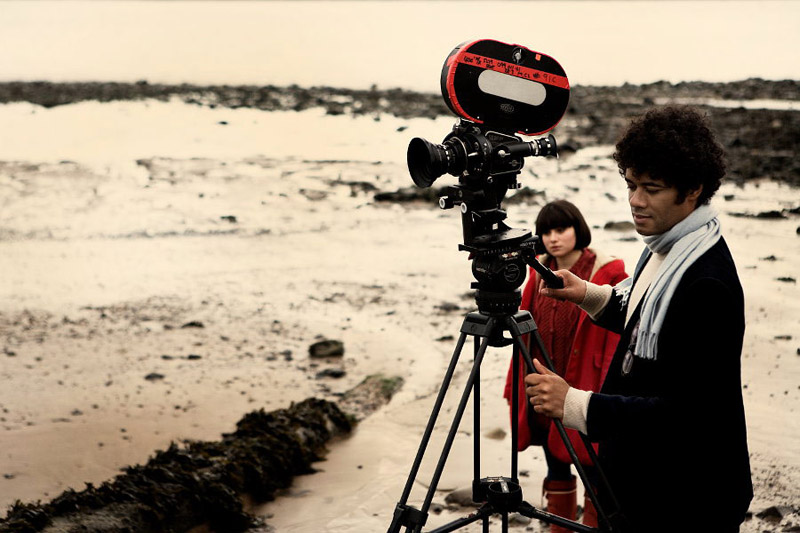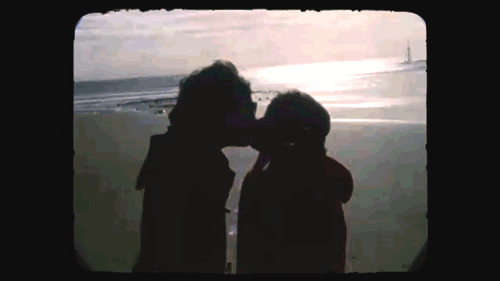"Sometimes I wish there was a film crew following my every move. I imagine the camera craning up as I walk away. But, unless things improve, the biopic of my life will only have the budget for a zoom out.*" —Oliver Tate
Thought I would make a return to the blog's original format by doing a post on camera techniques.
Submarine was directed by one of my favourite humans on the planet,
Richard Ayoade. It was his debut feature-length film, and I must say that the guy knows his stuff. It is always important for directors to
avoid lazy filming styles, and Ayoade goes far beyond achieving that goal. Through visuals alone, he quite flawlessly created the feel of every teenager's fear of obscurity and the struggle to create the individual self whilst having to deal with real life situational and relational struggles.
Firstly, I would like to draw attention to Ayoade's use of framing. In this film, at least, he has a tendency toward shooting behind the characters, generally with a medium shot or medium long shot, to create an OTS or third-person shot. This is pretty normal fare but, once the viewer sees it often enough, an intriguing pattern begins to emerge. When the camera stays furtively in the background, the audience effectively occupies the personal space of the characters in shot. Rather than feeling forced or invasive, however, the story simply becomes more intimate. Onlookers experience the scene
with the characters by seeing the same things in the distance but are also allowed to exist separately by examining them from the foreground. Colours and lighting are also given special consideration to enhance the execution of this type of scene.
 |
| Picspam created par moi. |
Ayoade does quite a few unique things with this film, some of which I have never seen before. In the interest of keeping this post from being too lengthy, I have screencapped a number of the more striking visual elements and identified them to the best of my ability. Enjoy!
 |
| lens flare and a medium close-up on the profile of Craig Roberts as Oliver Tate |
 |
| overhead/boom tilt shot at odds with sharp angels within the scene (AKA Dutch angle) |
 |
| iris in leading to a flashback narrative montage |
 |
| nostalgia lens with deep focus |
 |
| in-frame lens with red distortion |
 |
| point of view shot/reverse angle and kaleidoscope lens |
 |
| mise en scène perfection |
 |
| a wonderfully set up left-to-right tracking shot via dolly |
 |
| purposefully over the top chroma keying |
 |
| MCU from a parallel side angle, i.e., gorgeous framing |
 |
| slight overhead shot with carefully laid-out set design |
 |
| close-up of a letter |
 |
| varying degrees of rack focus |
 |
| high key lighting (?) and zoom on Yasmin Paige as Jordana Bevan |
 |
| super 8 reel montage |
The entire film is rife with compelling cinematic approaches including:
- a well-placed freeze frame
- instances of shaky cam
- the two shot
- a rotating camera
- subjective camera
- a cheeky pull back shot*
- multiple cuts between two characters in quick succession
- filming via reflection in mirrors + through windows and a fish tank
- back-lit bokeh lighting
- insertion of title cards
- cuts & fades to blue and red
- the incorporation of old television footage
- the use of silence in contrast with diegetic sound emphasis
- non-diegetic narration
- and a crap ton of others
If Ayode employs the same amount of attention to detail in his second film
The Double, then I will be very excited when it comes out on DVD this August. If you want to see
Submarine for yourself—and I recommend that you do—it is available on
Netflix and
Amazon Instant Video. (It is also based off a
book of the same name written by
Joe Dunthorne.)
P.S.- Ayoade has a book coming out this October, if you're into reading and comedy and other...stuff.
Ayoade on Ayoade: A Cinematic Odyssey
Edit 10/10/14: Just saw
The Double via
Netflix, and it did not disappoint. Aoyade is clearly at the top of his game.
For further information:




















What an eye-opener. I never really gave much thought to the camera techniques employed to add layers, drama, intimacy and perspective to a film.
ReplyDeleteMy viewpoint has shifted radically, which will only benefit future film watching.